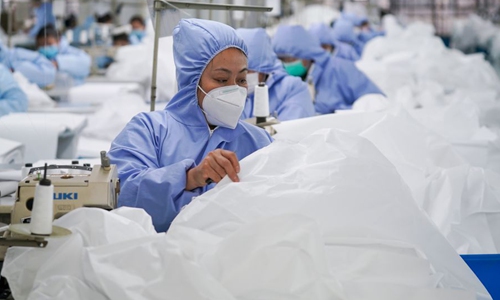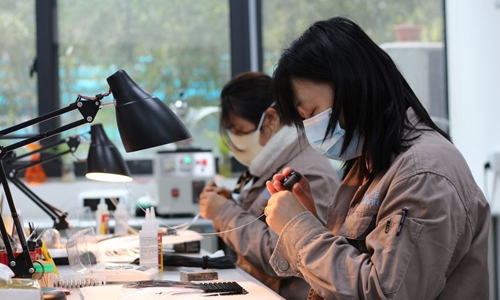HOME >> SOURCE
Chinese firms boost "immunity" to coronavirus fallout
Source:Xinhua Published: 2020/2/16 13:26:26

Workers make general protective suits at Hongdou Industrial Co., Ltd. in Wuxi, east China's Jiangsu Province, Feb. 8, 2020. (Xinhua/Li Bo)
Although the novel coronavirus outbreak is to have a temporary negative impact on the world's second-largest economy, Chinese companies have never given up hope of finding a way out of this dilemma and strengthening their immunity to the fallout.
Since the contagion coincided with the Spring Festival holiday, various industries in China, including catering, retail, manufacturing and tourism have been heavily impacted. Hotels, restaurants, shopping malls and tourist sites which should have been in full swing at this moment are actually quiet and empty.
As more and more workers have gone back to work since the extended holiday ended, domestic firms are racing to cut losses through their own efforts with the help of the government.
COMPANIES' RAPID ADJUSTMENT
Zhang Liqing is the owner of a restaurant that serves Chinese Huaiyang cuisine in east China's Jiangsu Province.
"People used to stand in a long line to wait for a table, especially during the Spring Festival. This year, however, we have already lost about 1 million yuan (about 143,000 US dollars) due to the shutdown of the restaurant since the first day of the Lunar New Year," Zhang said.
Although the owner does not know when he can reopen his restaurant, he said he has to do something.

A resident displays an advertisement of an online shopping WeChat group published by a shopping mall in Nanjing, east China's Jiangsu Province, Feb. 15, 2020. (Xinhua/Li Bo)
"I'm training my employees online and also learning new business models such as take-out food and non-contact orders. I think these measures will help me resist the damage of the epidemic in the future," Zhang said.
Due to the huge demand for medical materials during the outbreak, masks and protective outfits, in particular, some Chinese enterprises have accelerated their adjustment of production structure.
In the city of Wuxi, Jiangsu Hongdou Industrial Co., Ltd., a clothing maker, has pitched in.
"We transformed a factory into a workshop for disposable medical protective clothing and upgraded technologies to produce such products," said Gu Jinlong, executive vice president of the company.
The company completed its first general protective suit on Feb. 3 and its daily output has now increased to about 40,000 pieces. It is now waiting for the permission of the government to produce medical protective suits.
Shi Yun, 29, living in the city of Nanjing, found a new way to kill time since residents are suggested to stay home to avoid virus infections. She found that many shopping malls in Nanjing displaying their new products, including the latest collections of clothes online through group chats on WeChat or other apps.
"It feels like virtual window shopping," said Shi, who only needs to browse on her computer or mobile phone, instead of in a mall.
In order to pull through, brick and mortar retailers have been forced to run their businesses through social media platforms. According to He Huan, a manager at Deji Plaza, a Nanjing-based shopping mall complex selling luxury goods, the mall has set up various group chats based on commodity categories and even launched an online shopping app to cater to customers.
"So far, sales for cosmetics and fashion brands are satisfactory. We are willing to keep improving our online services," He said.

Employees work at the Molarray Biotechnology Co. at Suzhou Industrial Park in Suzhou, east China's Jiangsu Province, Feb. 7, 2020. (Xinhua)
Didano Technology Co., Ltd., located in southwest China's Sichuan Province, specializes in robotics for children's health. Their customers were mainly kindergartens and preschool education institutions.
But the outbreak brought the company some new ideas. The company has advanced technologies and turned their robotics products into infrared temperature measuring robots.
"The new robots, which can check people's temperature rapidly and accurately, can be used in hospitals, companies, schools, factories and other public venues with huge people flows," said Xu Bo, CEO of the company, adding they have sold 71 such robots in three days to local hospitals and companies, and they have started to presell and produce 300 such robots.
Sun Jian, general manager of Frimec (Jiangsu) Environmental Technology Co., is very optimistic. His company focuses on air-cleaning facilities.
"After the epidemic, the demand for air purification in China will soar. The impact of the epidemic won't last long, and the demand for such products will rise sharply in the second quarter. We are making preparations for that," Sun added.
GOVERNMENT SUPPORT
While enterprises are racking their brains to strengthen their immunity against the outbreak, governments at all levels across China are also making efforts to give a helping hand.
Molarray Biotechnology Co., a high-tech company located in Suzhou Industrial Park, Jiangsu, received timely help, a 5-million-yuan loan offered by a local bank, after the company reported financial problems as it was in full capacity to provide products in urgent need to curb the contagion. It only took about five days from the application to get the loan.
The government of Suzhou, one of the manufacturing hubs in the country, rolled out various policies in early February including financial support and tax cuts to aid companies affected by the epidemic.
For many small and medium-sized enterprises, rent during the epidemic is definitely a burden. Fortunately, nearly 20 provincial-level regions across China have announced policies to cut or exempt rent.
In Shandong Province, the local government set up a special emergency unit and opened a round-the-clock hotline to answer requests from businesses and resolve their difficulties during the resumption of work.
The State Grid Sichuan Electric Power Company has also introduced a series of measures to support local enterprises, including cutting electricity costs.
China has stepped up targeted financing support for epidemic-stricken small and micro-enterprises. Banks have offered more credit loans to such firms, especially those in sectors hit hardest by the epidemic and in Hubei Province.
(Qin Huajiang from Jiangsu, Yuan Junbao from Shandong, Yang Di and Li Qianwei from Sichuan contributed to the story)
Posted in: ECONOMY